Analysis of Business Environment: Iceland Supermarket - Unit 1 Report
VerifiedAdded on 2020/01/15
|13
|4144
|230
Report
AI Summary
This report provides a comprehensive analysis of the business environment, focusing on Iceland Supermarket. It begins by defining the business environment and the organizational purpose of Iceland Supermarket, KFC, TFL, and Cancer Research. The report then examines how Iceland Supermarket meets the objectives of its stakeholders, both internal (employees, managers, owners) and external (suppliers, society, government, shareholders, and customers). The report further analyzes the impact of different economic systems (command, free enterprise, mixed, and transitional) on resource allocation. It explores the influence of fiscal and monetary policies, including exchange rates, interest rates, and tax rates, on the company's operations. The analysis extends to competition policy, regulatory mechanisms, and market structures (oligopoly, monopoly, perfect competition), illustrating how these factors determine pricing and output decisions. The report also discusses the impact of market forces, such as customer demand and supply, on Iceland Supermarket's organizational response. Finally, it addresses the significance of international trade, the influence of global factors, and the impact of European Union policies on the business. The report concludes with a summary of the key findings and their implications for Iceland Supermarket.
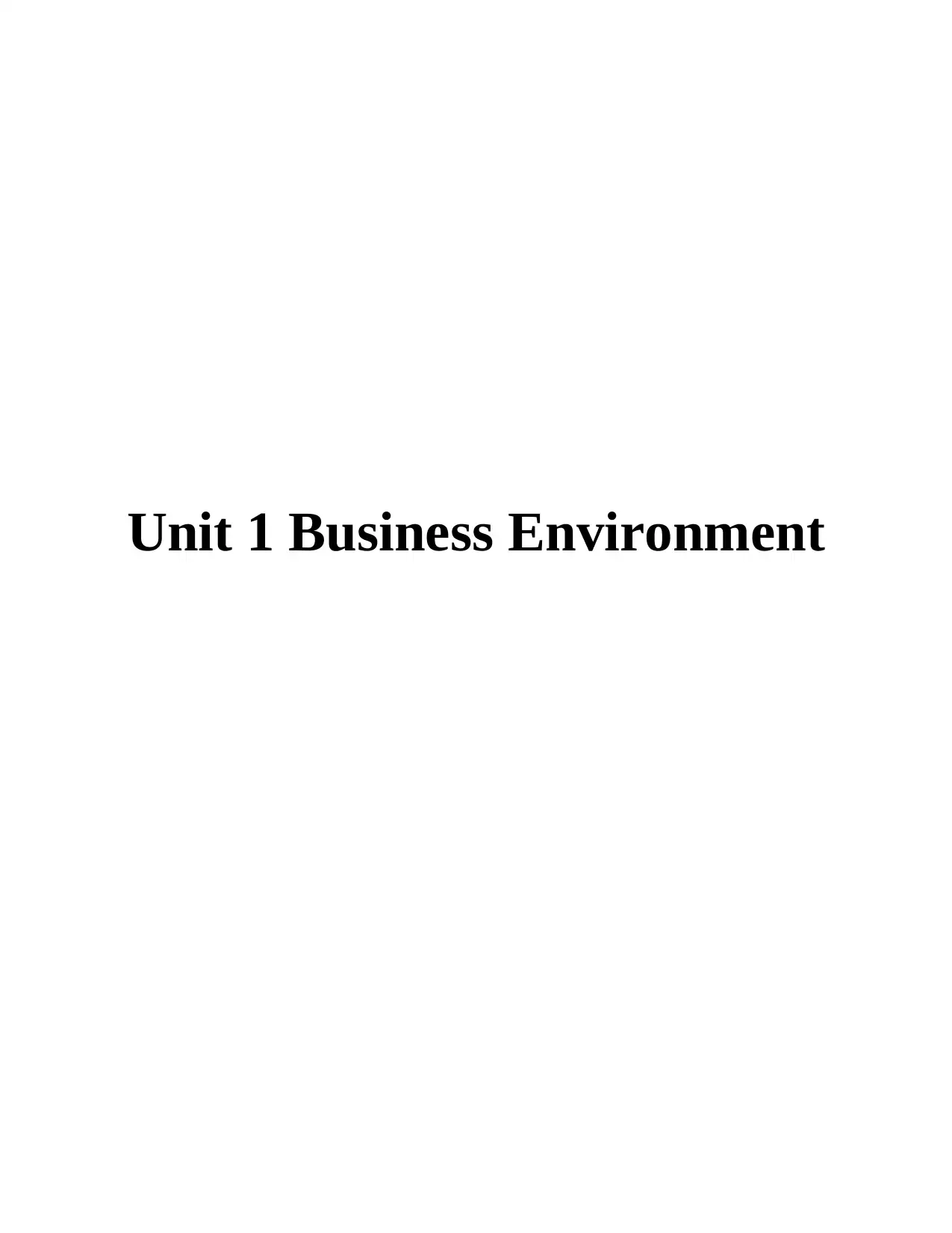
Unit 1 Business Environment
Paraphrase This Document
Need a fresh take? Get an instant paraphrase of this document with our AI Paraphraser
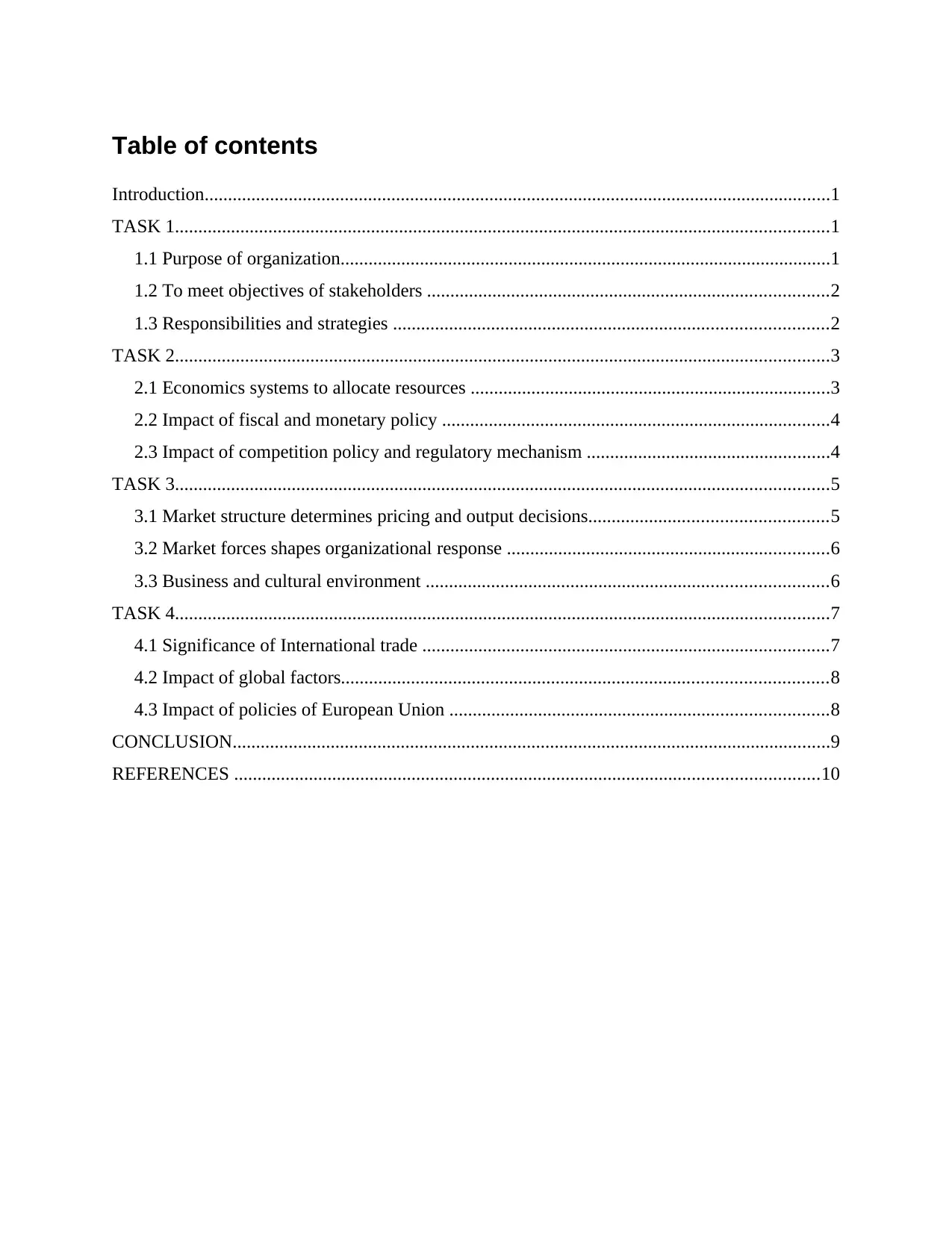
Table of contents
Introduction......................................................................................................................................1
TASK 1............................................................................................................................................1
1.1 Purpose of organization.........................................................................................................1
1.2 To meet objectives of stakeholders ......................................................................................2
1.3 Responsibilities and strategies .............................................................................................2
TASK 2............................................................................................................................................3
2.1 Economics systems to allocate resources .............................................................................3
2.2 Impact of fiscal and monetary policy ...................................................................................4
2.3 Impact of competition policy and regulatory mechanism ....................................................4
TASK 3............................................................................................................................................5
3.1 Market structure determines pricing and output decisions...................................................5
3.2 Market forces shapes organizational response .....................................................................6
3.3 Business and cultural environment ......................................................................................6
TASK 4............................................................................................................................................7
4.1 Significance of International trade .......................................................................................7
4.2 Impact of global factors........................................................................................................8
4.3 Impact of policies of European Union .................................................................................8
CONCLUSION................................................................................................................................9
REFERENCES .............................................................................................................................10
Introduction......................................................................................................................................1
TASK 1............................................................................................................................................1
1.1 Purpose of organization.........................................................................................................1
1.2 To meet objectives of stakeholders ......................................................................................2
1.3 Responsibilities and strategies .............................................................................................2
TASK 2............................................................................................................................................3
2.1 Economics systems to allocate resources .............................................................................3
2.2 Impact of fiscal and monetary policy ...................................................................................4
2.3 Impact of competition policy and regulatory mechanism ....................................................4
TASK 3............................................................................................................................................5
3.1 Market structure determines pricing and output decisions...................................................5
3.2 Market forces shapes organizational response .....................................................................6
3.3 Business and cultural environment ......................................................................................6
TASK 4............................................................................................................................................7
4.1 Significance of International trade .......................................................................................7
4.2 Impact of global factors........................................................................................................8
4.3 Impact of policies of European Union .................................................................................8
CONCLUSION................................................................................................................................9
REFERENCES .............................................................................................................................10
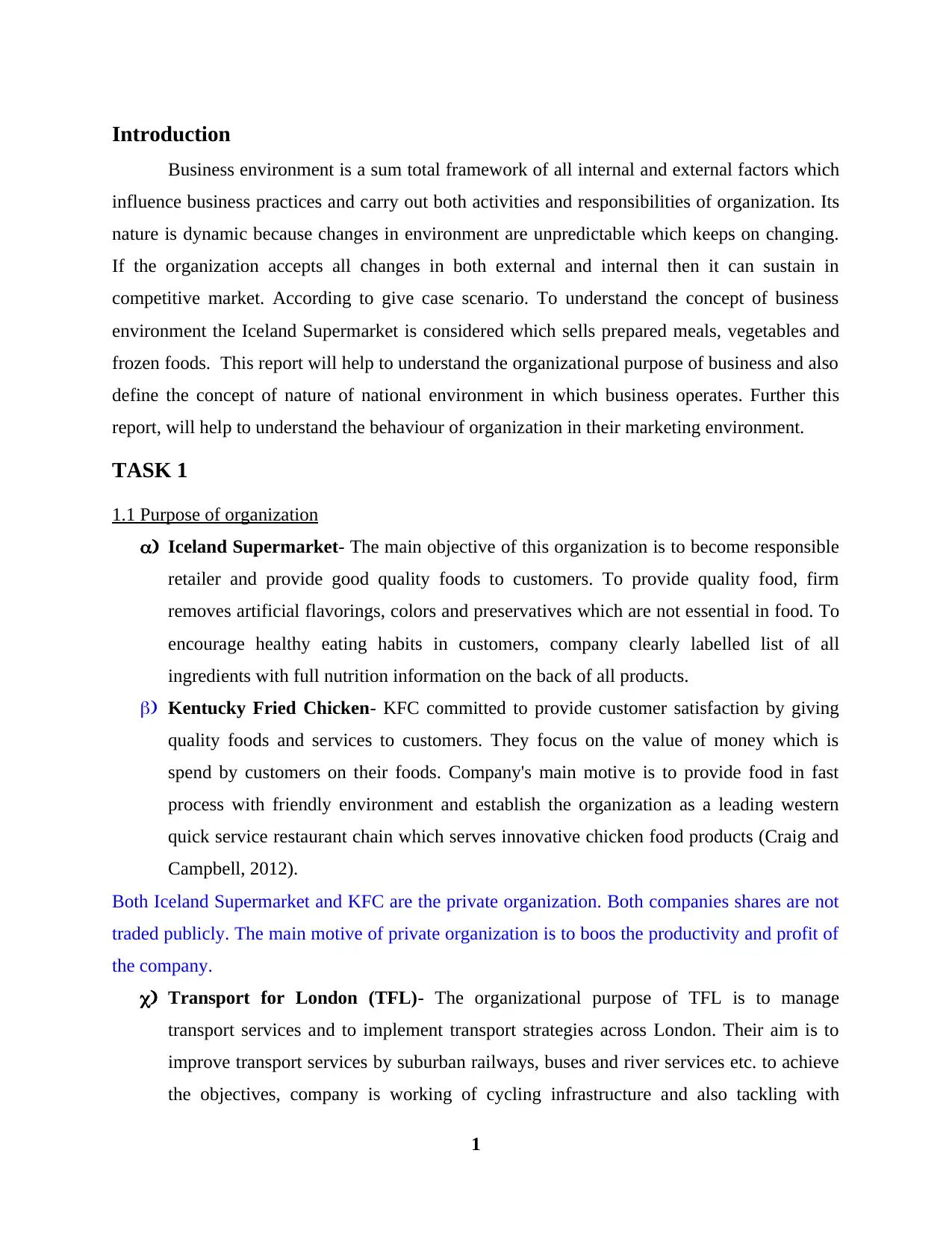
Introduction
Business environment is a sum total framework of all internal and external factors which
influence business practices and carry out both activities and responsibilities of organization. Its
nature is dynamic because changes in environment are unpredictable which keeps on changing.
If the organization accepts all changes in both external and internal then it can sustain in
competitive market. According to give case scenario. To understand the concept of business
environment the Iceland Supermarket is considered which sells prepared meals, vegetables and
frozen foods. This report will help to understand the organizational purpose of business and also
define the concept of nature of national environment in which business operates. Further this
report, will help to understand the behaviour of organization in their marketing environment.
TASK 1
1.1 Purpose of organization
a) Iceland Supermarket- The main objective of this organization is to become responsible
retailer and provide good quality foods to customers. To provide quality food, firm
removes artificial flavorings, colors and preservatives which are not essential in food. To
encourage healthy eating habits in customers, company clearly labelled list of all
ingredients with full nutrition information on the back of all products.
b) Kentucky Fried Chicken- KFC committed to provide customer satisfaction by giving
quality foods and services to customers. They focus on the value of money which is
spend by customers on their foods. Company's main motive is to provide food in fast
process with friendly environment and establish the organization as a leading western
quick service restaurant chain which serves innovative chicken food products (Craig and
Campbell, 2012).
Both Iceland Supermarket and KFC are the private organization. Both companies shares are not
traded publicly. The main motive of private organization is to boos the productivity and profit of
the company.
c) Transport for London (TFL)- The organizational purpose of TFL is to manage
transport services and to implement transport strategies across London. Their aim is to
improve transport services by suburban railways, buses and river services etc. to achieve
the objectives, company is working of cycling infrastructure and also tackling with
1
Business environment is a sum total framework of all internal and external factors which
influence business practices and carry out both activities and responsibilities of organization. Its
nature is dynamic because changes in environment are unpredictable which keeps on changing.
If the organization accepts all changes in both external and internal then it can sustain in
competitive market. According to give case scenario. To understand the concept of business
environment the Iceland Supermarket is considered which sells prepared meals, vegetables and
frozen foods. This report will help to understand the organizational purpose of business and also
define the concept of nature of national environment in which business operates. Further this
report, will help to understand the behaviour of organization in their marketing environment.
TASK 1
1.1 Purpose of organization
a) Iceland Supermarket- The main objective of this organization is to become responsible
retailer and provide good quality foods to customers. To provide quality food, firm
removes artificial flavorings, colors and preservatives which are not essential in food. To
encourage healthy eating habits in customers, company clearly labelled list of all
ingredients with full nutrition information on the back of all products.
b) Kentucky Fried Chicken- KFC committed to provide customer satisfaction by giving
quality foods and services to customers. They focus on the value of money which is
spend by customers on their foods. Company's main motive is to provide food in fast
process with friendly environment and establish the organization as a leading western
quick service restaurant chain which serves innovative chicken food products (Craig and
Campbell, 2012).
Both Iceland Supermarket and KFC are the private organization. Both companies shares are not
traded publicly. The main motive of private organization is to boos the productivity and profit of
the company.
c) Transport for London (TFL)- The organizational purpose of TFL is to manage
transport services and to implement transport strategies across London. Their aim is to
improve transport services by suburban railways, buses and river services etc. to achieve
the objectives, company is working of cycling infrastructure and also tackling with
1
⊘ This is a preview!⊘
Do you want full access?
Subscribe today to unlock all pages.

Trusted by 1+ million students worldwide
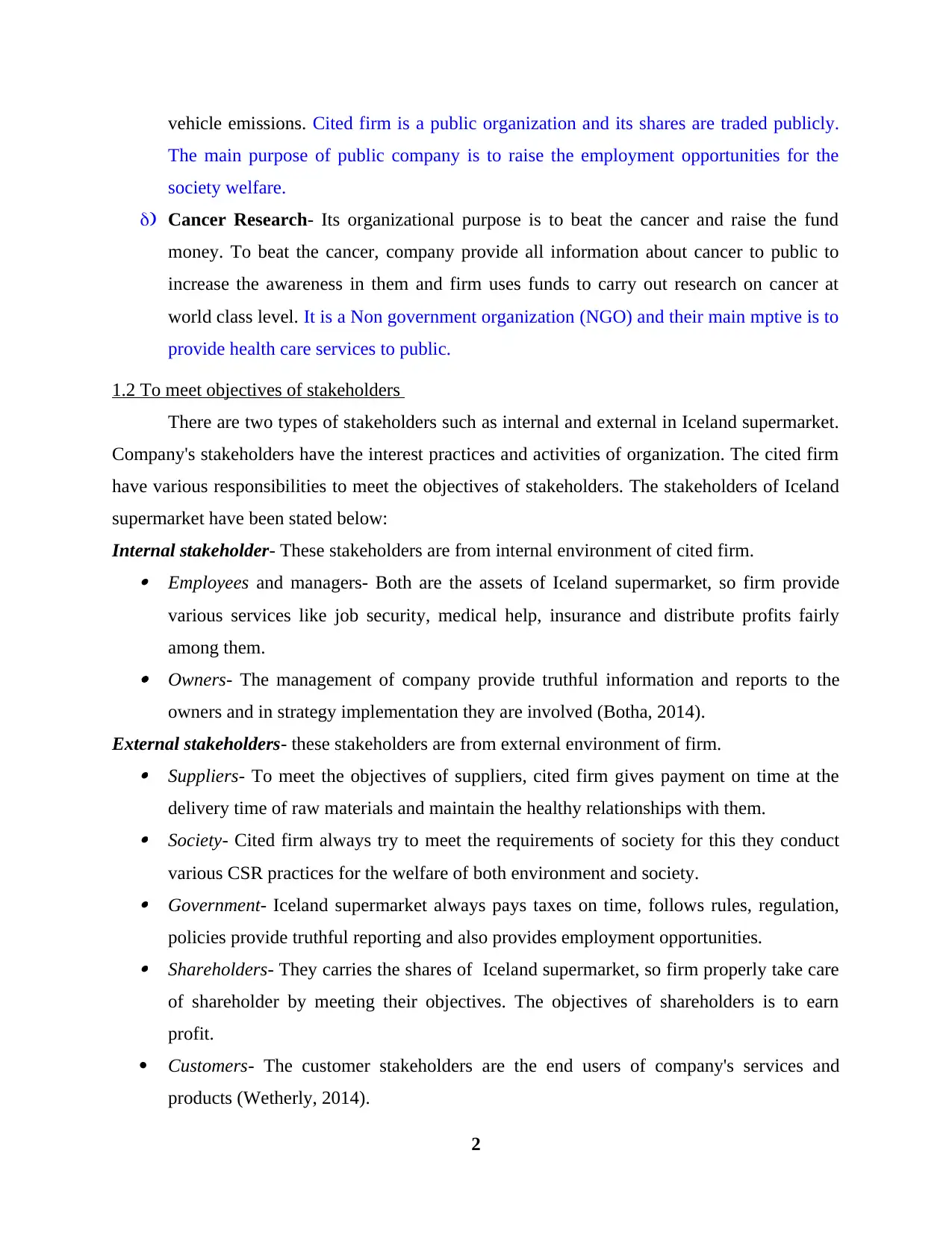
vehicle emissions. Cited firm is a public organization and its shares are traded publicly.
The main purpose of public company is to raise the employment opportunities for the
society welfare.
d) Cancer Research- Its organizational purpose is to beat the cancer and raise the fund
money. To beat the cancer, company provide all information about cancer to public to
increase the awareness in them and firm uses funds to carry out research on cancer at
world class level. It is a Non government organization (NGO) and their main mptive is to
provide health care services to public.
1.2 To meet objectives of stakeholders
There are two types of stakeholders such as internal and external in Iceland supermarket.
Company's stakeholders have the interest practices and activities of organization. The cited firm
have various responsibilities to meet the objectives of stakeholders. The stakeholders of Iceland
supermarket have been stated below:
Internal stakeholder- These stakeholders are from internal environment of cited firm. Employees and managers- Both are the assets of Iceland supermarket, so firm provide
various services like job security, medical help, insurance and distribute profits fairly
among them. Owners- The management of company provide truthful information and reports to the
owners and in strategy implementation they are involved (Botha, 2014).
External stakeholders- these stakeholders are from external environment of firm. Suppliers- To meet the objectives of suppliers, cited firm gives payment on time at the
delivery time of raw materials and maintain the healthy relationships with them. Society- Cited firm always try to meet the requirements of society for this they conduct
various CSR practices for the welfare of both environment and society. Government- Iceland supermarket always pays taxes on time, follows rules, regulation,
policies provide truthful reporting and also provides employment opportunities. Shareholders- They carries the shares of Iceland supermarket, so firm properly take care
of shareholder by meeting their objectives. The objectives of shareholders is to earn
profit.
Customers- The customer stakeholders are the end users of company's services and
products (Wetherly, 2014).
2
The main purpose of public company is to raise the employment opportunities for the
society welfare.
d) Cancer Research- Its organizational purpose is to beat the cancer and raise the fund
money. To beat the cancer, company provide all information about cancer to public to
increase the awareness in them and firm uses funds to carry out research on cancer at
world class level. It is a Non government organization (NGO) and their main mptive is to
provide health care services to public.
1.2 To meet objectives of stakeholders
There are two types of stakeholders such as internal and external in Iceland supermarket.
Company's stakeholders have the interest practices and activities of organization. The cited firm
have various responsibilities to meet the objectives of stakeholders. The stakeholders of Iceland
supermarket have been stated below:
Internal stakeholder- These stakeholders are from internal environment of cited firm. Employees and managers- Both are the assets of Iceland supermarket, so firm provide
various services like job security, medical help, insurance and distribute profits fairly
among them. Owners- The management of company provide truthful information and reports to the
owners and in strategy implementation they are involved (Botha, 2014).
External stakeholders- these stakeholders are from external environment of firm. Suppliers- To meet the objectives of suppliers, cited firm gives payment on time at the
delivery time of raw materials and maintain the healthy relationships with them. Society- Cited firm always try to meet the requirements of society for this they conduct
various CSR practices for the welfare of both environment and society. Government- Iceland supermarket always pays taxes on time, follows rules, regulation,
policies provide truthful reporting and also provides employment opportunities. Shareholders- They carries the shares of Iceland supermarket, so firm properly take care
of shareholder by meeting their objectives. The objectives of shareholders is to earn
profit.
Customers- The customer stakeholders are the end users of company's services and
products (Wetherly, 2014).
2
Paraphrase This Document
Need a fresh take? Get an instant paraphrase of this document with our AI Paraphraser
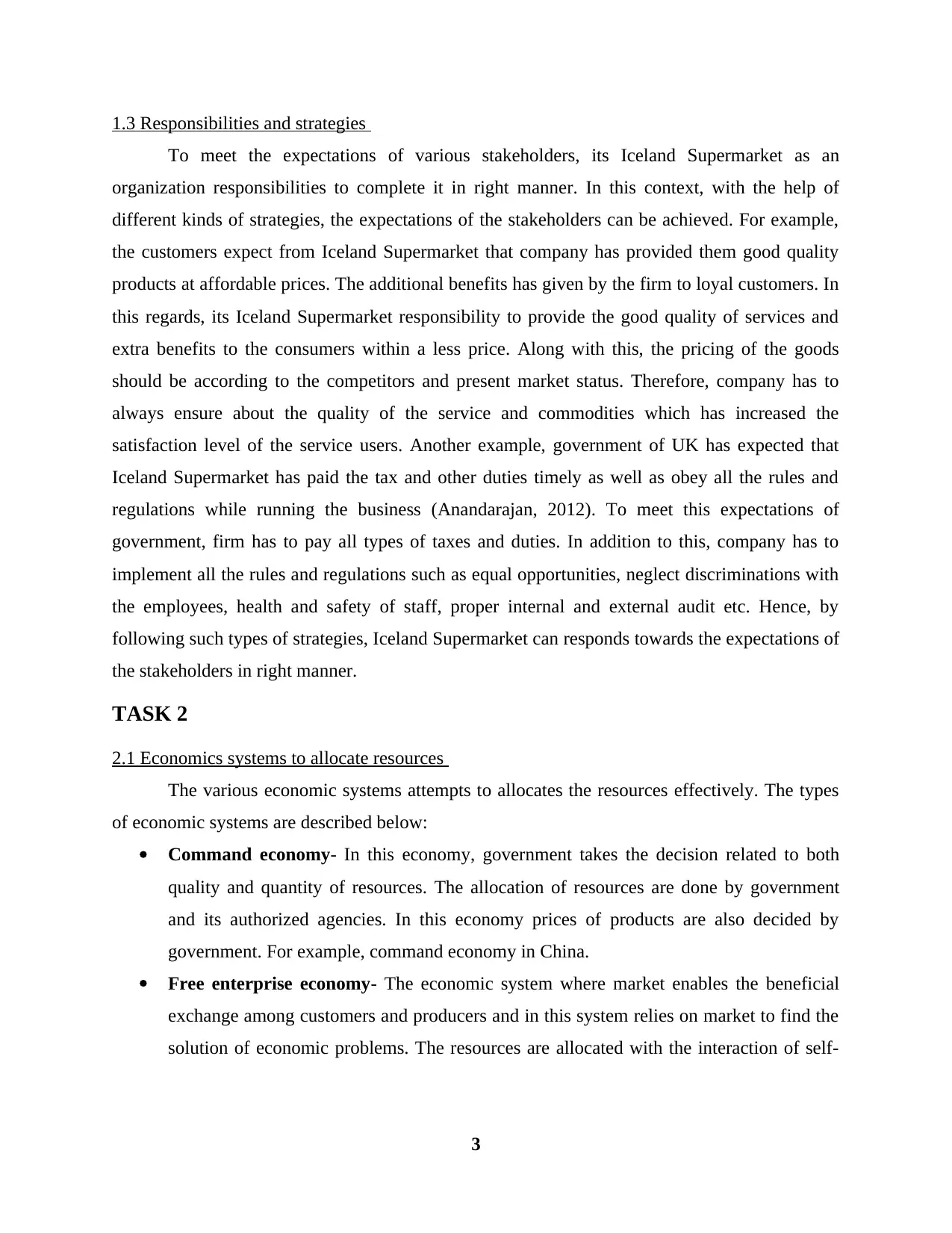
1.3 Responsibilities and strategies
To meet the expectations of various stakeholders, its Iceland Supermarket as an
organization responsibilities to complete it in right manner. In this context, with the help of
different kinds of strategies, the expectations of the stakeholders can be achieved. For example,
the customers expect from Iceland Supermarket that company has provided them good quality
products at affordable prices. The additional benefits has given by the firm to loyal customers. In
this regards, its Iceland Supermarket responsibility to provide the good quality of services and
extra benefits to the consumers within a less price. Along with this, the pricing of the goods
should be according to the competitors and present market status. Therefore, company has to
always ensure about the quality of the service and commodities which has increased the
satisfaction level of the service users. Another example, government of UK has expected that
Iceland Supermarket has paid the tax and other duties timely as well as obey all the rules and
regulations while running the business (Anandarajan, 2012). To meet this expectations of
government, firm has to pay all types of taxes and duties. In addition to this, company has to
implement all the rules and regulations such as equal opportunities, neglect discriminations with
the employees, health and safety of staff, proper internal and external audit etc. Hence, by
following such types of strategies, Iceland Supermarket can responds towards the expectations of
the stakeholders in right manner.
TASK 2
2.1 Economics systems to allocate resources
The various economic systems attempts to allocates the resources effectively. The types
of economic systems are described below:
Command economy- In this economy, government takes the decision related to both
quality and quantity of resources. The allocation of resources are done by government
and its authorized agencies. In this economy prices of products are also decided by
government. For example, command economy in China.
Free enterprise economy- The economic system where market enables the beneficial
exchange among customers and producers and in this system relies on market to find the
solution of economic problems. The resources are allocated with the interaction of self-
3
To meet the expectations of various stakeholders, its Iceland Supermarket as an
organization responsibilities to complete it in right manner. In this context, with the help of
different kinds of strategies, the expectations of the stakeholders can be achieved. For example,
the customers expect from Iceland Supermarket that company has provided them good quality
products at affordable prices. The additional benefits has given by the firm to loyal customers. In
this regards, its Iceland Supermarket responsibility to provide the good quality of services and
extra benefits to the consumers within a less price. Along with this, the pricing of the goods
should be according to the competitors and present market status. Therefore, company has to
always ensure about the quality of the service and commodities which has increased the
satisfaction level of the service users. Another example, government of UK has expected that
Iceland Supermarket has paid the tax and other duties timely as well as obey all the rules and
regulations while running the business (Anandarajan, 2012). To meet this expectations of
government, firm has to pay all types of taxes and duties. In addition to this, company has to
implement all the rules and regulations such as equal opportunities, neglect discriminations with
the employees, health and safety of staff, proper internal and external audit etc. Hence, by
following such types of strategies, Iceland Supermarket can responds towards the expectations of
the stakeholders in right manner.
TASK 2
2.1 Economics systems to allocate resources
The various economic systems attempts to allocates the resources effectively. The types
of economic systems are described below:
Command economy- In this economy, government takes the decision related to both
quality and quantity of resources. The allocation of resources are done by government
and its authorized agencies. In this economy prices of products are also decided by
government. For example, command economy in China.
Free enterprise economy- The economic system where market enables the beneficial
exchange among customers and producers and in this system relies on market to find the
solution of economic problems. The resources are allocated with the interaction of self-
3
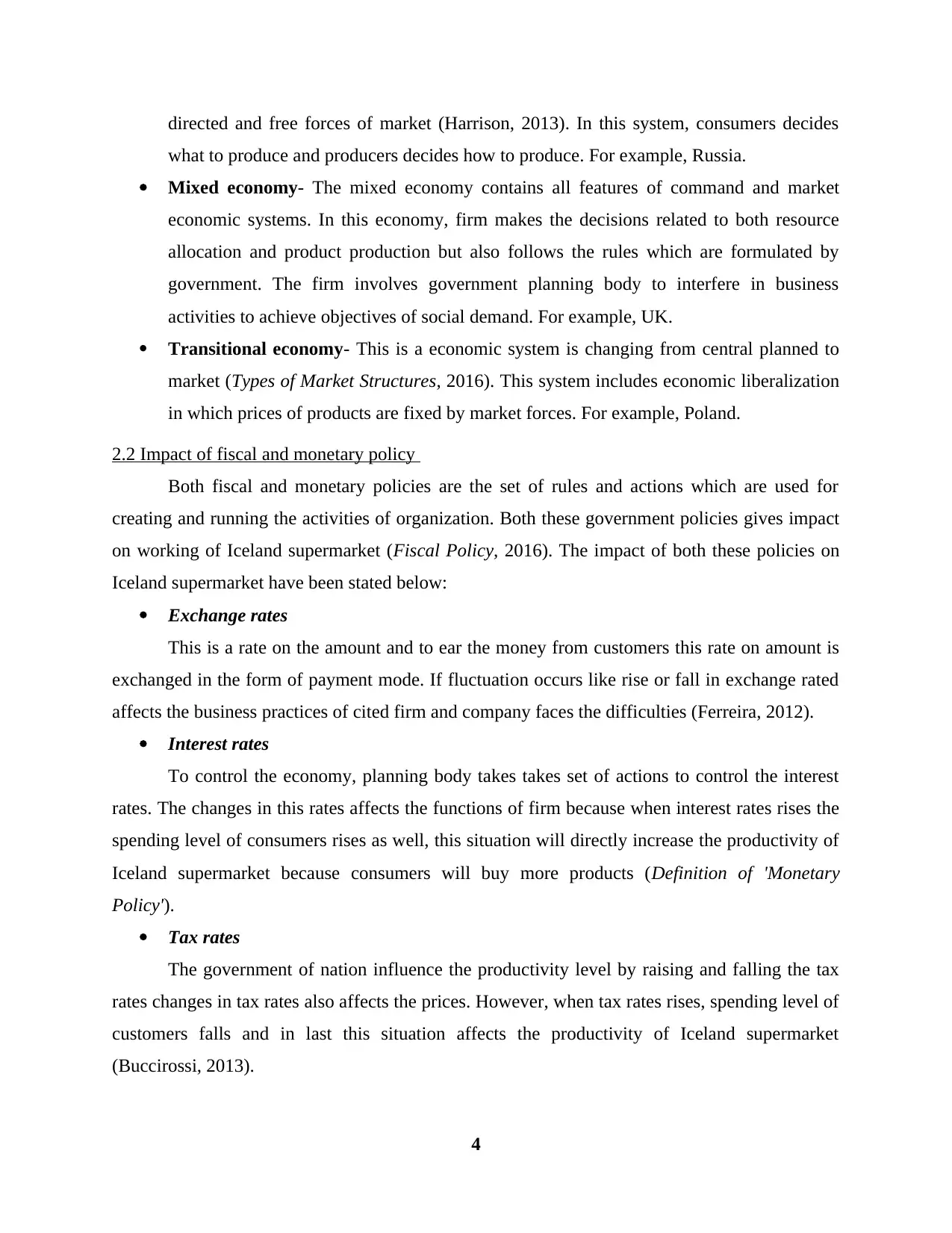
directed and free forces of market (Harrison, 2013). In this system, consumers decides
what to produce and producers decides how to produce. For example, Russia.
Mixed economy- The mixed economy contains all features of command and market
economic systems. In this economy, firm makes the decisions related to both resource
allocation and product production but also follows the rules which are formulated by
government. The firm involves government planning body to interfere in business
activities to achieve objectives of social demand. For example, UK.
Transitional economy- This is a economic system is changing from central planned to
market (Types of Market Structures, 2016). This system includes economic liberalization
in which prices of products are fixed by market forces. For example, Poland.
2.2 Impact of fiscal and monetary policy
Both fiscal and monetary policies are the set of rules and actions which are used for
creating and running the activities of organization. Both these government policies gives impact
on working of Iceland supermarket (Fiscal Policy, 2016). The impact of both these policies on
Iceland supermarket have been stated below:
Exchange rates
This is a rate on the amount and to ear the money from customers this rate on amount is
exchanged in the form of payment mode. If fluctuation occurs like rise or fall in exchange rated
affects the business practices of cited firm and company faces the difficulties (Ferreira, 2012).
Interest rates
To control the economy, planning body takes takes set of actions to control the interest
rates. The changes in this rates affects the functions of firm because when interest rates rises the
spending level of consumers rises as well, this situation will directly increase the productivity of
Iceland supermarket because consumers will buy more products (Definition of 'Monetary
Policy').
Tax rates
The government of nation influence the productivity level by raising and falling the tax
rates changes in tax rates also affects the prices. However, when tax rates rises, spending level of
customers falls and in last this situation affects the productivity of Iceland supermarket
(Buccirossi, 2013).
4
what to produce and producers decides how to produce. For example, Russia.
Mixed economy- The mixed economy contains all features of command and market
economic systems. In this economy, firm makes the decisions related to both resource
allocation and product production but also follows the rules which are formulated by
government. The firm involves government planning body to interfere in business
activities to achieve objectives of social demand. For example, UK.
Transitional economy- This is a economic system is changing from central planned to
market (Types of Market Structures, 2016). This system includes economic liberalization
in which prices of products are fixed by market forces. For example, Poland.
2.2 Impact of fiscal and monetary policy
Both fiscal and monetary policies are the set of rules and actions which are used for
creating and running the activities of organization. Both these government policies gives impact
on working of Iceland supermarket (Fiscal Policy, 2016). The impact of both these policies on
Iceland supermarket have been stated below:
Exchange rates
This is a rate on the amount and to ear the money from customers this rate on amount is
exchanged in the form of payment mode. If fluctuation occurs like rise or fall in exchange rated
affects the business practices of cited firm and company faces the difficulties (Ferreira, 2012).
Interest rates
To control the economy, planning body takes takes set of actions to control the interest
rates. The changes in this rates affects the functions of firm because when interest rates rises the
spending level of consumers rises as well, this situation will directly increase the productivity of
Iceland supermarket because consumers will buy more products (Definition of 'Monetary
Policy').
Tax rates
The government of nation influence the productivity level by raising and falling the tax
rates changes in tax rates also affects the prices. However, when tax rates rises, spending level of
customers falls and in last this situation affects the productivity of Iceland supermarket
(Buccirossi, 2013).
4
⊘ This is a preview!⊘
Do you want full access?
Subscribe today to unlock all pages.

Trusted by 1+ million students worldwide
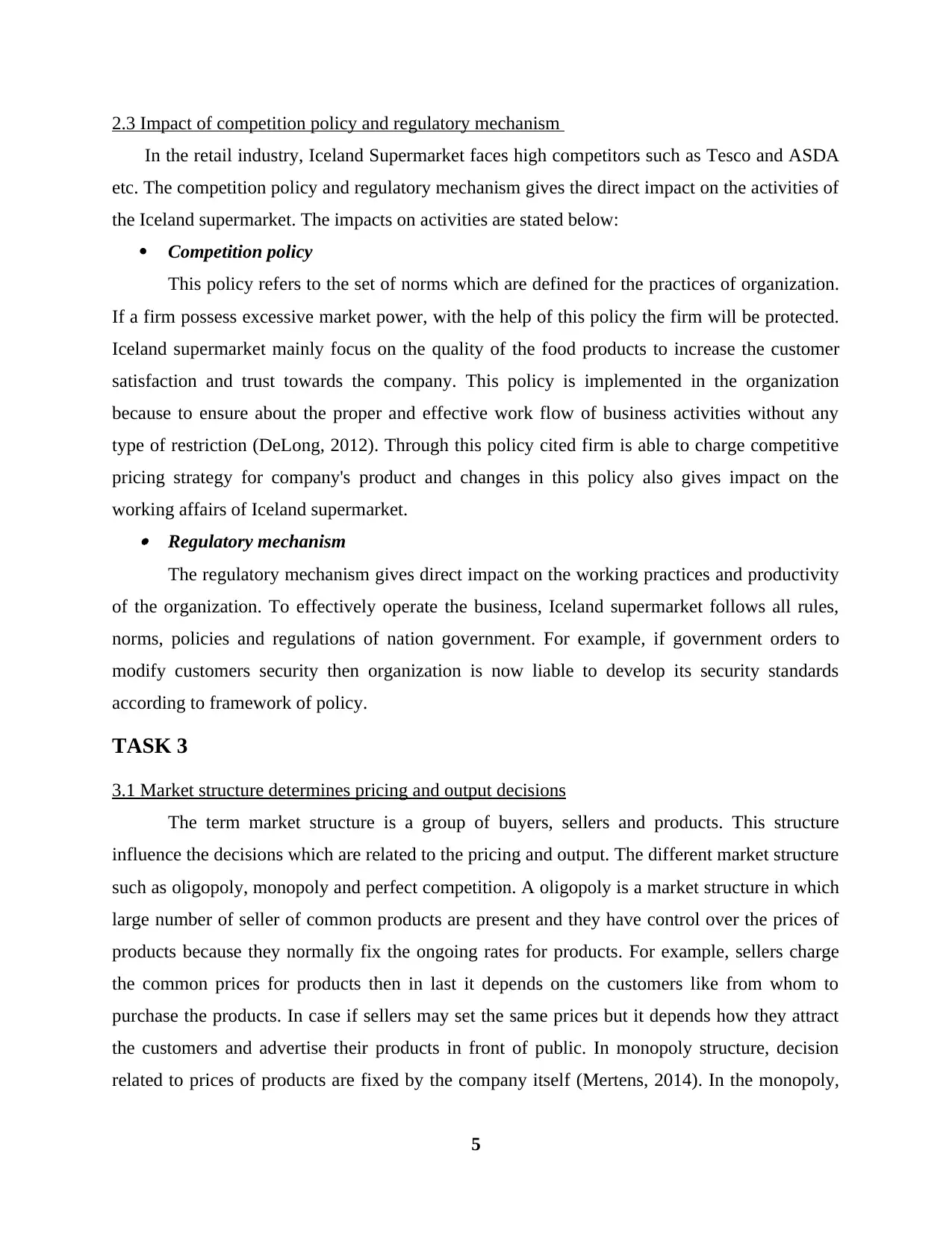
2.3 Impact of competition policy and regulatory mechanism
In the retail industry, Iceland Supermarket faces high competitors such as Tesco and ASDA
etc. The competition policy and regulatory mechanism gives the direct impact on the activities of
the Iceland supermarket. The impacts on activities are stated below:
Competition policy
This policy refers to the set of norms which are defined for the practices of organization.
If a firm possess excessive market power, with the help of this policy the firm will be protected.
Iceland supermarket mainly focus on the quality of the food products to increase the customer
satisfaction and trust towards the company. This policy is implemented in the organization
because to ensure about the proper and effective work flow of business activities without any
type of restriction (DeLong, 2012). Through this policy cited firm is able to charge competitive
pricing strategy for company's product and changes in this policy also gives impact on the
working affairs of Iceland supermarket. Regulatory mechanism
The regulatory mechanism gives direct impact on the working practices and productivity
of the organization. To effectively operate the business, Iceland supermarket follows all rules,
norms, policies and regulations of nation government. For example, if government orders to
modify customers security then organization is now liable to develop its security standards
according to framework of policy.
TASK 3
3.1 Market structure determines pricing and output decisions
The term market structure is a group of buyers, sellers and products. This structure
influence the decisions which are related to the pricing and output. The different market structure
such as oligopoly, monopoly and perfect competition. A oligopoly is a market structure in which
large number of seller of common products are present and they have control over the prices of
products because they normally fix the ongoing rates for products. For example, sellers charge
the common prices for products then in last it depends on the customers like from whom to
purchase the products. In case if sellers may set the same prices but it depends how they attract
the customers and advertise their products in front of public. In monopoly structure, decision
related to prices of products are fixed by the company itself (Mertens, 2014). In the monopoly,
5
In the retail industry, Iceland Supermarket faces high competitors such as Tesco and ASDA
etc. The competition policy and regulatory mechanism gives the direct impact on the activities of
the Iceland supermarket. The impacts on activities are stated below:
Competition policy
This policy refers to the set of norms which are defined for the practices of organization.
If a firm possess excessive market power, with the help of this policy the firm will be protected.
Iceland supermarket mainly focus on the quality of the food products to increase the customer
satisfaction and trust towards the company. This policy is implemented in the organization
because to ensure about the proper and effective work flow of business activities without any
type of restriction (DeLong, 2012). Through this policy cited firm is able to charge competitive
pricing strategy for company's product and changes in this policy also gives impact on the
working affairs of Iceland supermarket. Regulatory mechanism
The regulatory mechanism gives direct impact on the working practices and productivity
of the organization. To effectively operate the business, Iceland supermarket follows all rules,
norms, policies and regulations of nation government. For example, if government orders to
modify customers security then organization is now liable to develop its security standards
according to framework of policy.
TASK 3
3.1 Market structure determines pricing and output decisions
The term market structure is a group of buyers, sellers and products. This structure
influence the decisions which are related to the pricing and output. The different market structure
such as oligopoly, monopoly and perfect competition. A oligopoly is a market structure in which
large number of seller of common products are present and they have control over the prices of
products because they normally fix the ongoing rates for products. For example, sellers charge
the common prices for products then in last it depends on the customers like from whom to
purchase the products. In case if sellers may set the same prices but it depends how they attract
the customers and advertise their products in front of public. In monopoly structure, decision
related to prices of products are fixed by the company itself (Mertens, 2014). In the monopoly,
5
Paraphrase This Document
Need a fresh take? Get an instant paraphrase of this document with our AI Paraphraser
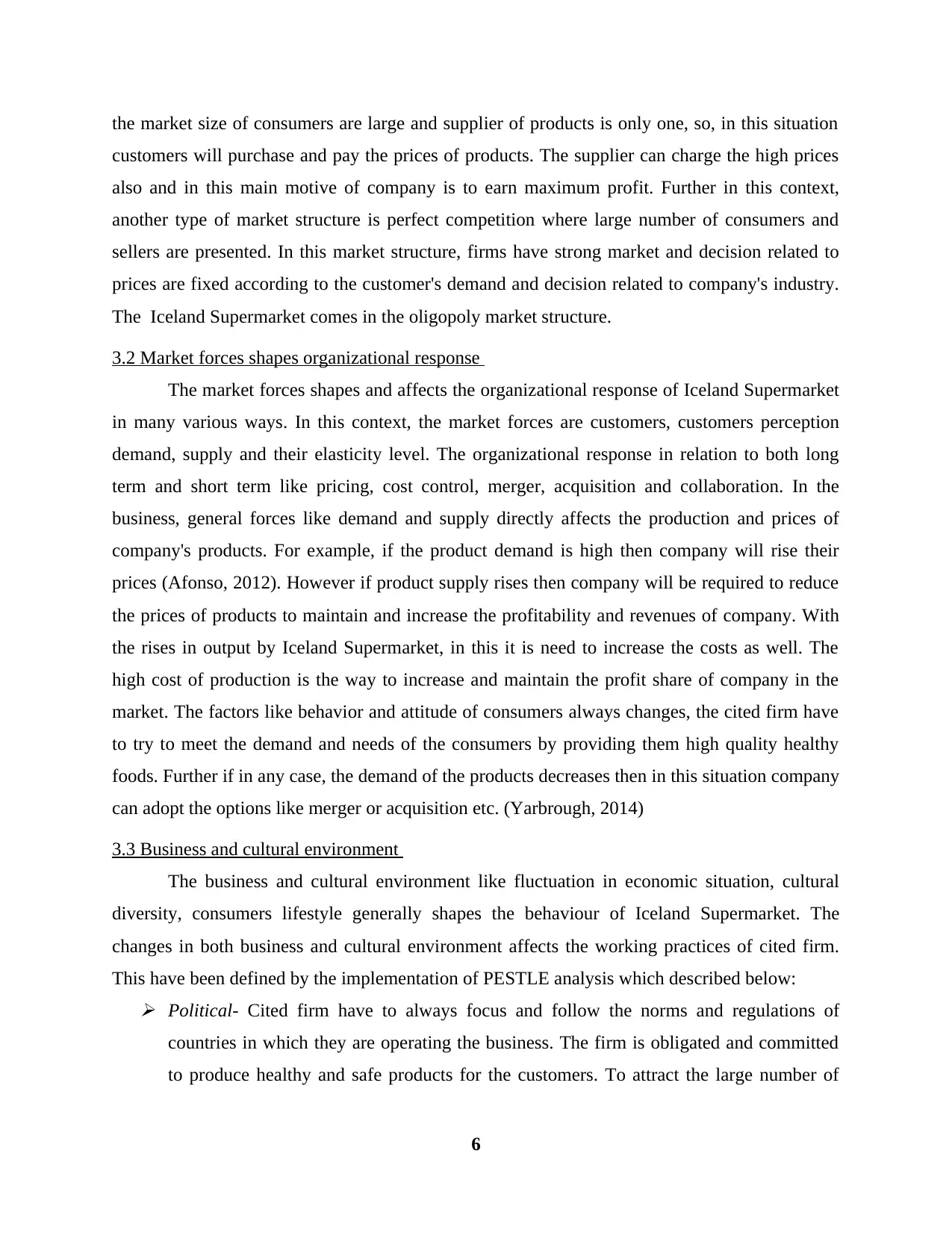
the market size of consumers are large and supplier of products is only one, so, in this situation
customers will purchase and pay the prices of products. The supplier can charge the high prices
also and in this main motive of company is to earn maximum profit. Further in this context,
another type of market structure is perfect competition where large number of consumers and
sellers are presented. In this market structure, firms have strong market and decision related to
prices are fixed according to the customer's demand and decision related to company's industry.
The Iceland Supermarket comes in the oligopoly market structure.
3.2 Market forces shapes organizational response
The market forces shapes and affects the organizational response of Iceland Supermarket
in many various ways. In this context, the market forces are customers, customers perception
demand, supply and their elasticity level. The organizational response in relation to both long
term and short term like pricing, cost control, merger, acquisition and collaboration. In the
business, general forces like demand and supply directly affects the production and prices of
company's products. For example, if the product demand is high then company will rise their
prices (Afonso, 2012). However if product supply rises then company will be required to reduce
the prices of products to maintain and increase the profitability and revenues of company. With
the rises in output by Iceland Supermarket, in this it is need to increase the costs as well. The
high cost of production is the way to increase and maintain the profit share of company in the
market. The factors like behavior and attitude of consumers always changes, the cited firm have
to try to meet the demand and needs of the consumers by providing them high quality healthy
foods. Further if in any case, the demand of the products decreases then in this situation company
can adopt the options like merger or acquisition etc. (Yarbrough, 2014)
3.3 Business and cultural environment
The business and cultural environment like fluctuation in economic situation, cultural
diversity, consumers lifestyle generally shapes the behaviour of Iceland Supermarket. The
changes in both business and cultural environment affects the working practices of cited firm.
This have been defined by the implementation of PESTLE analysis which described below: Political- Cited firm have to always focus and follow the norms and regulations of
countries in which they are operating the business. The firm is obligated and committed
to produce healthy and safe products for the customers. To attract the large number of
6
customers will purchase and pay the prices of products. The supplier can charge the high prices
also and in this main motive of company is to earn maximum profit. Further in this context,
another type of market structure is perfect competition where large number of consumers and
sellers are presented. In this market structure, firms have strong market and decision related to
prices are fixed according to the customer's demand and decision related to company's industry.
The Iceland Supermarket comes in the oligopoly market structure.
3.2 Market forces shapes organizational response
The market forces shapes and affects the organizational response of Iceland Supermarket
in many various ways. In this context, the market forces are customers, customers perception
demand, supply and their elasticity level. The organizational response in relation to both long
term and short term like pricing, cost control, merger, acquisition and collaboration. In the
business, general forces like demand and supply directly affects the production and prices of
company's products. For example, if the product demand is high then company will rise their
prices (Afonso, 2012). However if product supply rises then company will be required to reduce
the prices of products to maintain and increase the profitability and revenues of company. With
the rises in output by Iceland Supermarket, in this it is need to increase the costs as well. The
high cost of production is the way to increase and maintain the profit share of company in the
market. The factors like behavior and attitude of consumers always changes, the cited firm have
to try to meet the demand and needs of the consumers by providing them high quality healthy
foods. Further if in any case, the demand of the products decreases then in this situation company
can adopt the options like merger or acquisition etc. (Yarbrough, 2014)
3.3 Business and cultural environment
The business and cultural environment like fluctuation in economic situation, cultural
diversity, consumers lifestyle generally shapes the behaviour of Iceland Supermarket. The
changes in both business and cultural environment affects the working practices of cited firm.
This have been defined by the implementation of PESTLE analysis which described below: Political- Cited firm have to always focus and follow the norms and regulations of
countries in which they are operating the business. The firm is obligated and committed
to produce healthy and safe products for the customers. To attract the large number of
6
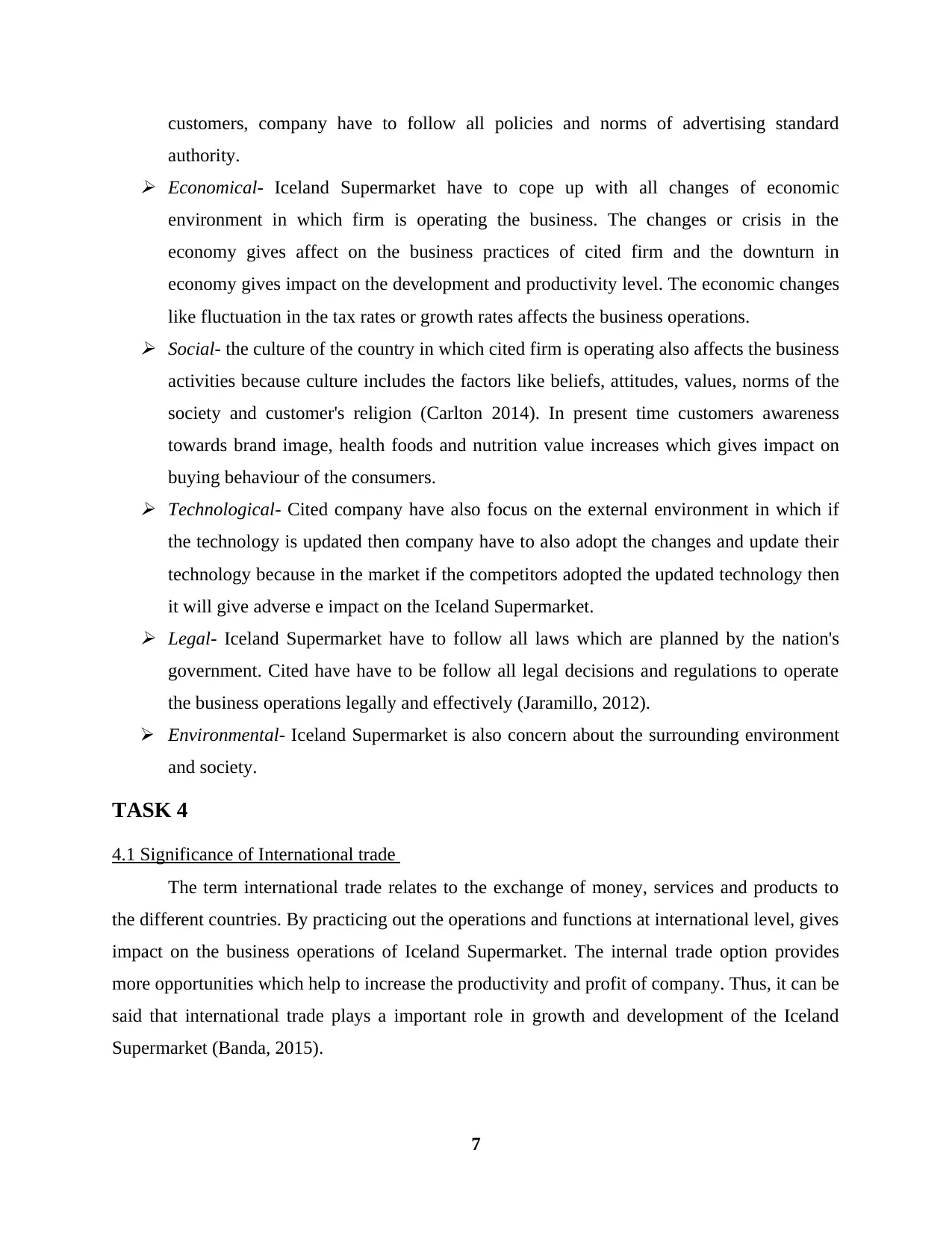
customers, company have to follow all policies and norms of advertising standard
authority. Economical- Iceland Supermarket have to cope up with all changes of economic
environment in which firm is operating the business. The changes or crisis in the
economy gives affect on the business practices of cited firm and the downturn in
economy gives impact on the development and productivity level. The economic changes
like fluctuation in the tax rates or growth rates affects the business operations. Social- the culture of the country in which cited firm is operating also affects the business
activities because culture includes the factors like beliefs, attitudes, values, norms of the
society and customer's religion (Carlton 2014). In present time customers awareness
towards brand image, health foods and nutrition value increases which gives impact on
buying behaviour of the consumers. Technological- Cited company have also focus on the external environment in which if
the technology is updated then company have to also adopt the changes and update their
technology because in the market if the competitors adopted the updated technology then
it will give adverse e impact on the Iceland Supermarket. Legal- Iceland Supermarket have to follow all laws which are planned by the nation's
government. Cited have have to be follow all legal decisions and regulations to operate
the business operations legally and effectively (Jaramillo, 2012).
Environmental- Iceland Supermarket is also concern about the surrounding environment
and society.
TASK 4
4.1 Significance of International trade
The term international trade relates to the exchange of money, services and products to
the different countries. By practicing out the operations and functions at international level, gives
impact on the business operations of Iceland Supermarket. The internal trade option provides
more opportunities which help to increase the productivity and profit of company. Thus, it can be
said that international trade plays a important role in growth and development of the Iceland
Supermarket (Banda, 2015).
7
authority. Economical- Iceland Supermarket have to cope up with all changes of economic
environment in which firm is operating the business. The changes or crisis in the
economy gives affect on the business practices of cited firm and the downturn in
economy gives impact on the development and productivity level. The economic changes
like fluctuation in the tax rates or growth rates affects the business operations. Social- the culture of the country in which cited firm is operating also affects the business
activities because culture includes the factors like beliefs, attitudes, values, norms of the
society and customer's religion (Carlton 2014). In present time customers awareness
towards brand image, health foods and nutrition value increases which gives impact on
buying behaviour of the consumers. Technological- Cited company have also focus on the external environment in which if
the technology is updated then company have to also adopt the changes and update their
technology because in the market if the competitors adopted the updated technology then
it will give adverse e impact on the Iceland Supermarket. Legal- Iceland Supermarket have to follow all laws which are planned by the nation's
government. Cited have have to be follow all legal decisions and regulations to operate
the business operations legally and effectively (Jaramillo, 2012).
Environmental- Iceland Supermarket is also concern about the surrounding environment
and society.
TASK 4
4.1 Significance of International trade
The term international trade relates to the exchange of money, services and products to
the different countries. By practicing out the operations and functions at international level, gives
impact on the business operations of Iceland Supermarket. The internal trade option provides
more opportunities which help to increase the productivity and profit of company. Thus, it can be
said that international trade plays a important role in growth and development of the Iceland
Supermarket (Banda, 2015).
7
⊘ This is a preview!⊘
Do you want full access?
Subscribe today to unlock all pages.

Trusted by 1+ million students worldwide
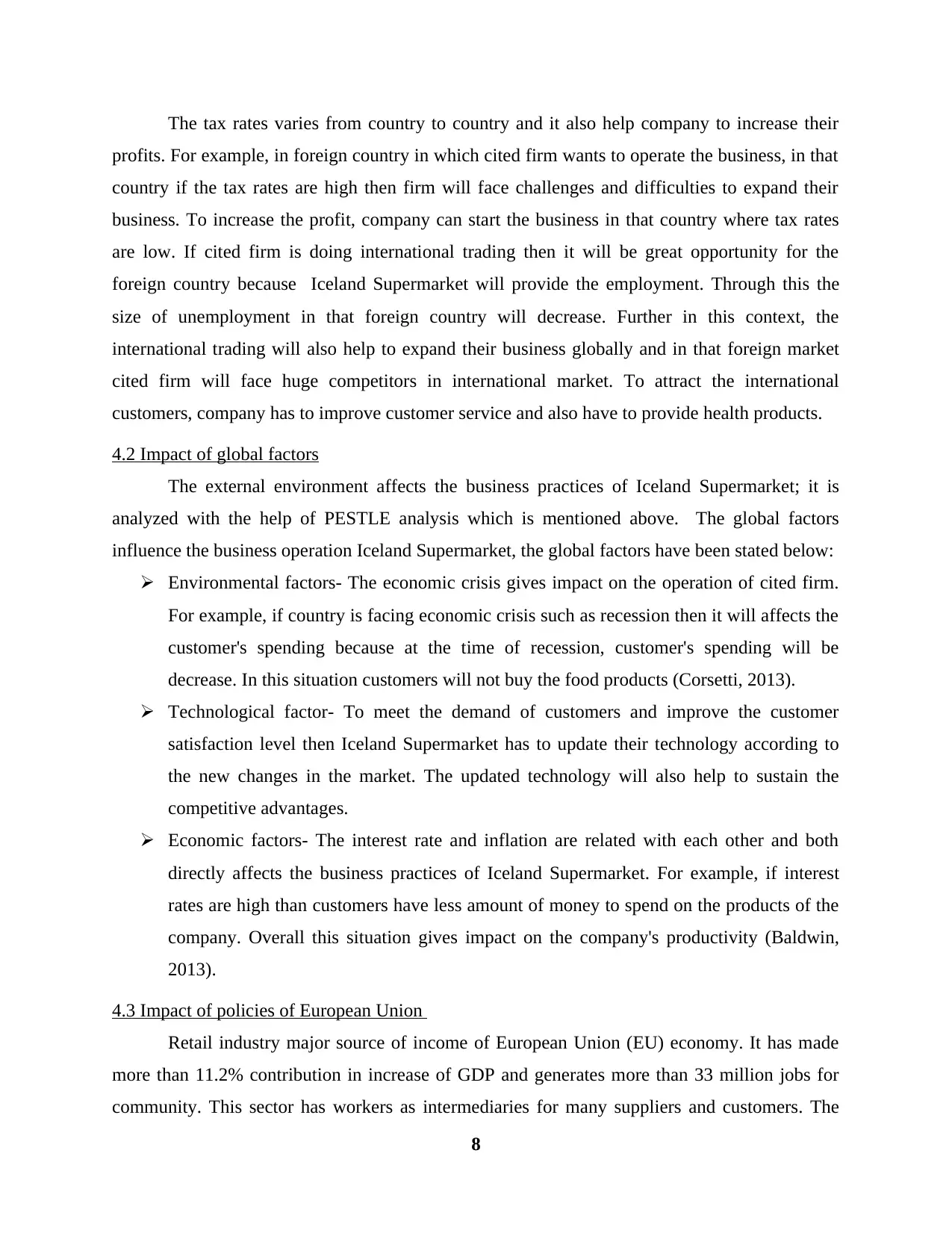
The tax rates varies from country to country and it also help company to increase their
profits. For example, in foreign country in which cited firm wants to operate the business, in that
country if the tax rates are high then firm will face challenges and difficulties to expand their
business. To increase the profit, company can start the business in that country where tax rates
are low. If cited firm is doing international trading then it will be great opportunity for the
foreign country because Iceland Supermarket will provide the employment. Through this the
size of unemployment in that foreign country will decrease. Further in this context, the
international trading will also help to expand their business globally and in that foreign market
cited firm will face huge competitors in international market. To attract the international
customers, company has to improve customer service and also have to provide health products.
4.2 Impact of global factors
The external environment affects the business practices of Iceland Supermarket; it is
analyzed with the help of PESTLE analysis which is mentioned above. The global factors
influence the business operation Iceland Supermarket, the global factors have been stated below:
Environmental factors- The economic crisis gives impact on the operation of cited firm.
For example, if country is facing economic crisis such as recession then it will affects the
customer's spending because at the time of recession, customer's spending will be
decrease. In this situation customers will not buy the food products (Corsetti, 2013).
Technological factor- To meet the demand of customers and improve the customer
satisfaction level then Iceland Supermarket has to update their technology according to
the new changes in the market. The updated technology will also help to sustain the
competitive advantages.
Economic factors- The interest rate and inflation are related with each other and both
directly affects the business practices of Iceland Supermarket. For example, if interest
rates are high than customers have less amount of money to spend on the products of the
company. Overall this situation gives impact on the company's productivity (Baldwin,
2013).
4.3 Impact of policies of European Union
Retail industry major source of income of European Union (EU) economy. It has made
more than 11.2% contribution in increase of GDP and generates more than 33 million jobs for
community. This sector has workers as intermediaries for many suppliers and customers. The
8
profits. For example, in foreign country in which cited firm wants to operate the business, in that
country if the tax rates are high then firm will face challenges and difficulties to expand their
business. To increase the profit, company can start the business in that country where tax rates
are low. If cited firm is doing international trading then it will be great opportunity for the
foreign country because Iceland Supermarket will provide the employment. Through this the
size of unemployment in that foreign country will decrease. Further in this context, the
international trading will also help to expand their business globally and in that foreign market
cited firm will face huge competitors in international market. To attract the international
customers, company has to improve customer service and also have to provide health products.
4.2 Impact of global factors
The external environment affects the business practices of Iceland Supermarket; it is
analyzed with the help of PESTLE analysis which is mentioned above. The global factors
influence the business operation Iceland Supermarket, the global factors have been stated below:
Environmental factors- The economic crisis gives impact on the operation of cited firm.
For example, if country is facing economic crisis such as recession then it will affects the
customer's spending because at the time of recession, customer's spending will be
decrease. In this situation customers will not buy the food products (Corsetti, 2013).
Technological factor- To meet the demand of customers and improve the customer
satisfaction level then Iceland Supermarket has to update their technology according to
the new changes in the market. The updated technology will also help to sustain the
competitive advantages.
Economic factors- The interest rate and inflation are related with each other and both
directly affects the business practices of Iceland Supermarket. For example, if interest
rates are high than customers have less amount of money to spend on the products of the
company. Overall this situation gives impact on the company's productivity (Baldwin,
2013).
4.3 Impact of policies of European Union
Retail industry major source of income of European Union (EU) economy. It has made
more than 11.2% contribution in increase of GDP and generates more than 33 million jobs for
community. This sector has workers as intermediaries for many suppliers and customers. The
8
Paraphrase This Document
Need a fresh take? Get an instant paraphrase of this document with our AI Paraphraser
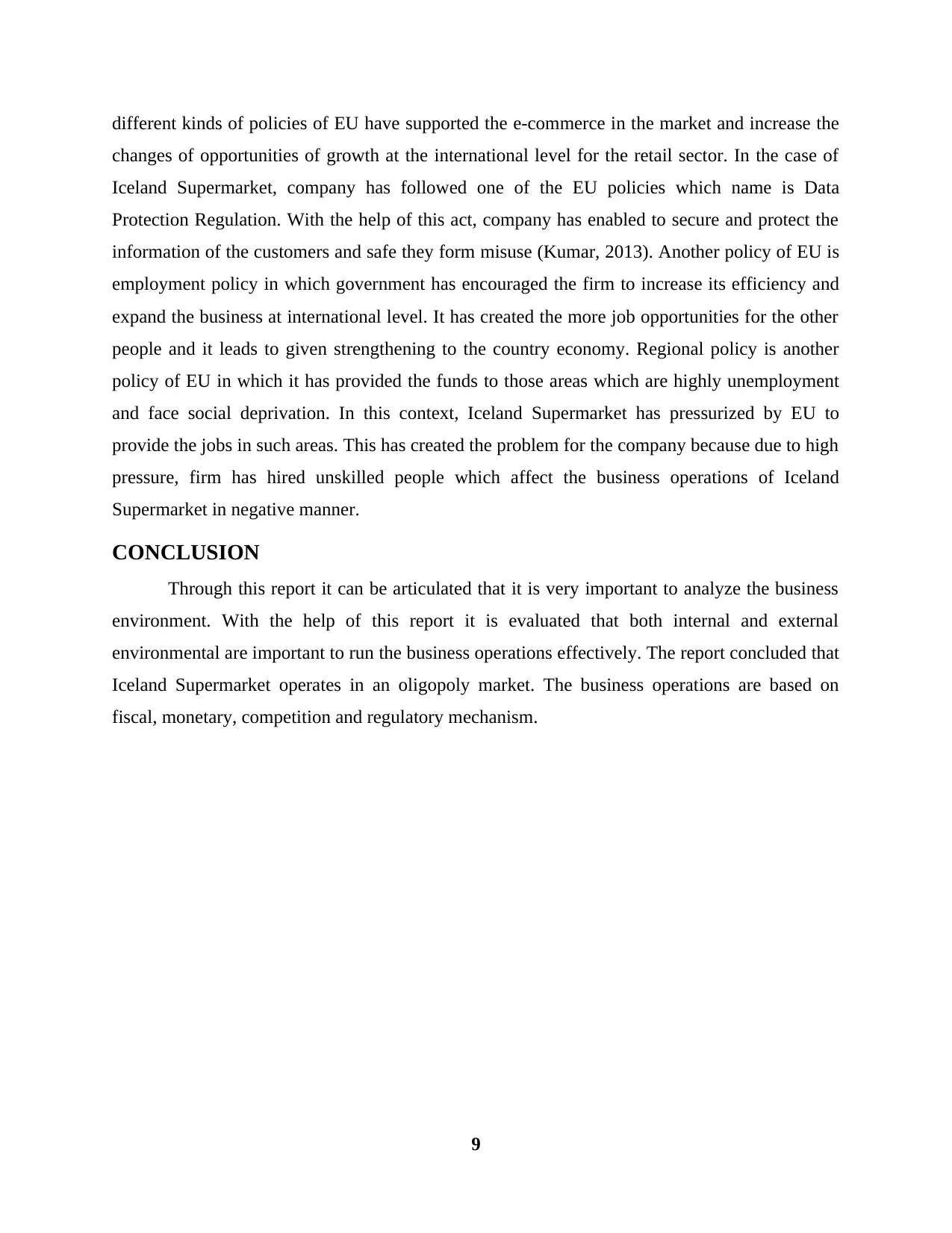
different kinds of policies of EU have supported the e-commerce in the market and increase the
changes of opportunities of growth at the international level for the retail sector. In the case of
Iceland Supermarket, company has followed one of the EU policies which name is Data
Protection Regulation. With the help of this act, company has enabled to secure and protect the
information of the customers and safe they form misuse (Kumar, 2013). Another policy of EU is
employment policy in which government has encouraged the firm to increase its efficiency and
expand the business at international level. It has created the more job opportunities for the other
people and it leads to given strengthening to the country economy. Regional policy is another
policy of EU in which it has provided the funds to those areas which are highly unemployment
and face social deprivation. In this context, Iceland Supermarket has pressurized by EU to
provide the jobs in such areas. This has created the problem for the company because due to high
pressure, firm has hired unskilled people which affect the business operations of Iceland
Supermarket in negative manner.
CONCLUSION
Through this report it can be articulated that it is very important to analyze the business
environment. With the help of this report it is evaluated that both internal and external
environmental are important to run the business operations effectively. The report concluded that
Iceland Supermarket operates in an oligopoly market. The business operations are based on
fiscal, monetary, competition and regulatory mechanism.
9
changes of opportunities of growth at the international level for the retail sector. In the case of
Iceland Supermarket, company has followed one of the EU policies which name is Data
Protection Regulation. With the help of this act, company has enabled to secure and protect the
information of the customers and safe they form misuse (Kumar, 2013). Another policy of EU is
employment policy in which government has encouraged the firm to increase its efficiency and
expand the business at international level. It has created the more job opportunities for the other
people and it leads to given strengthening to the country economy. Regional policy is another
policy of EU in which it has provided the funds to those areas which are highly unemployment
and face social deprivation. In this context, Iceland Supermarket has pressurized by EU to
provide the jobs in such areas. This has created the problem for the company because due to high
pressure, firm has hired unskilled people which affect the business operations of Iceland
Supermarket in negative manner.
CONCLUSION
Through this report it can be articulated that it is very important to analyze the business
environment. With the help of this report it is evaluated that both internal and external
environmental are important to run the business operations effectively. The report concluded that
Iceland Supermarket operates in an oligopoly market. The business operations are based on
fiscal, monetary, competition and regulatory mechanism.
9
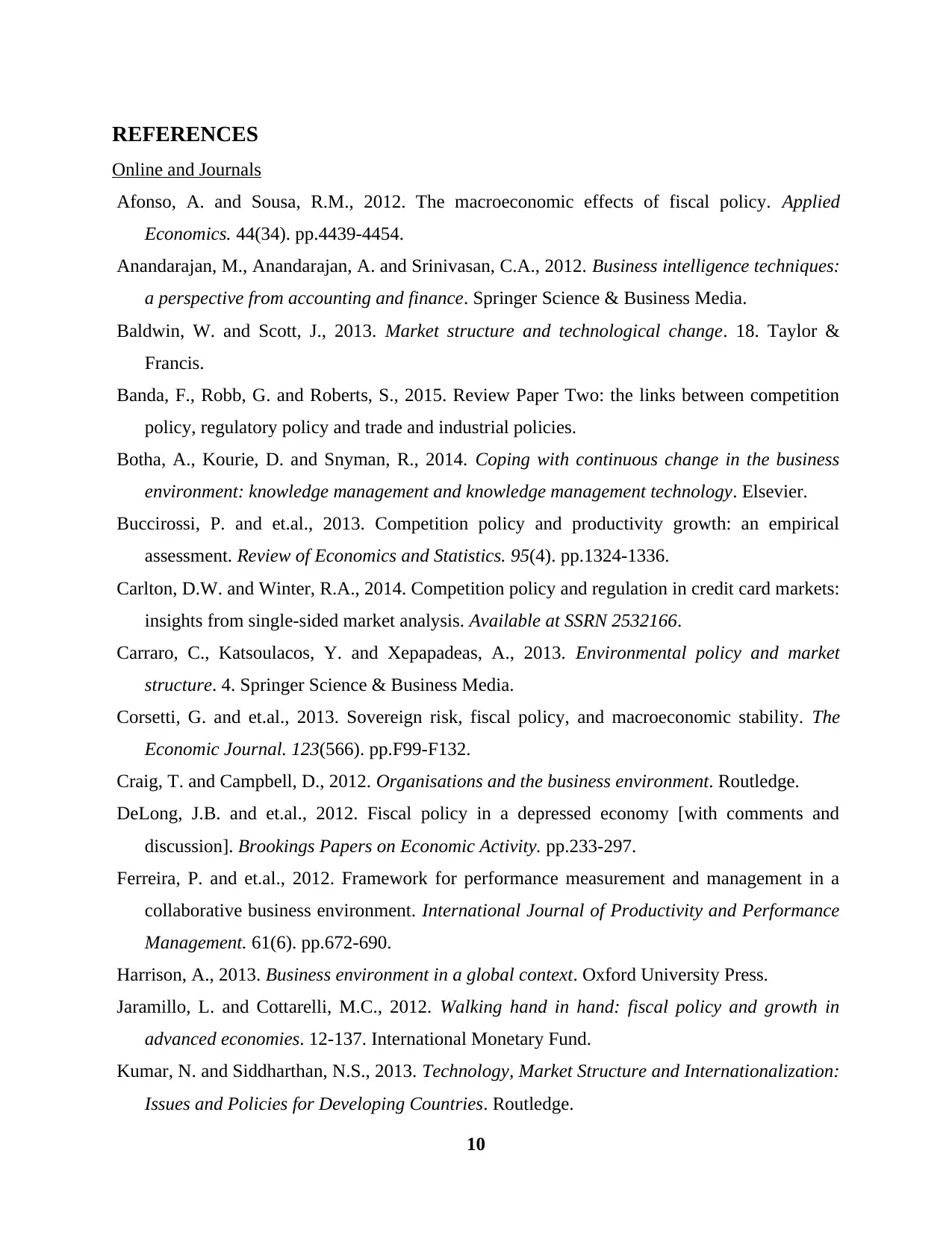
REFERENCES
Online and Journals
Afonso, A. and Sousa, R.M., 2012. The macroeconomic effects of fiscal policy. Applied
Economics. 44(34). pp.4439-4454.
Anandarajan, M., Anandarajan, A. and Srinivasan, C.A., 2012. Business intelligence techniques:
a perspective from accounting and finance. Springer Science & Business Media.
Baldwin, W. and Scott, J., 2013. Market structure and technological change. 18. Taylor &
Francis.
Banda, F., Robb, G. and Roberts, S., 2015. Review Paper Two: the links between competition
policy, regulatory policy and trade and industrial policies.
Botha, A., Kourie, D. and Snyman, R., 2014. Coping with continuous change in the business
environment: knowledge management and knowledge management technology. Elsevier.
Buccirossi, P. and et.al., 2013. Competition policy and productivity growth: an empirical
assessment. Review of Economics and Statistics. 95(4). pp.1324-1336.
Carlton, D.W. and Winter, R.A., 2014. Competition policy and regulation in credit card markets:
insights from single-sided market analysis. Available at SSRN 2532166.
Carraro, C., Katsoulacos, Y. and Xepapadeas, A., 2013. Environmental policy and market
structure. 4. Springer Science & Business Media.
Corsetti, G. and et.al., 2013. Sovereign risk, fiscal policy, and macroeconomic stability. The
Economic Journal. 123(566). pp.F99-F132.
Craig, T. and Campbell, D., 2012. Organisations and the business environment. Routledge.
DeLong, J.B. and et.al., 2012. Fiscal policy in a depressed economy [with comments and
discussion]. Brookings Papers on Economic Activity. pp.233-297.
Ferreira, P. and et.al., 2012. Framework for performance measurement and management in a
collaborative business environment. International Journal of Productivity and Performance
Management. 61(6). pp.672-690.
Harrison, A., 2013. Business environment in a global context. Oxford University Press.
Jaramillo, L. and Cottarelli, M.C., 2012. Walking hand in hand: fiscal policy and growth in
advanced economies. 12-137. International Monetary Fund.
Kumar, N. and Siddharthan, N.S., 2013. Technology, Market Structure and Internationalization:
Issues and Policies for Developing Countries. Routledge.
10
Online and Journals
Afonso, A. and Sousa, R.M., 2012. The macroeconomic effects of fiscal policy. Applied
Economics. 44(34). pp.4439-4454.
Anandarajan, M., Anandarajan, A. and Srinivasan, C.A., 2012. Business intelligence techniques:
a perspective from accounting and finance. Springer Science & Business Media.
Baldwin, W. and Scott, J., 2013. Market structure and technological change. 18. Taylor &
Francis.
Banda, F., Robb, G. and Roberts, S., 2015. Review Paper Two: the links between competition
policy, regulatory policy and trade and industrial policies.
Botha, A., Kourie, D. and Snyman, R., 2014. Coping with continuous change in the business
environment: knowledge management and knowledge management technology. Elsevier.
Buccirossi, P. and et.al., 2013. Competition policy and productivity growth: an empirical
assessment. Review of Economics and Statistics. 95(4). pp.1324-1336.
Carlton, D.W. and Winter, R.A., 2014. Competition policy and regulation in credit card markets:
insights from single-sided market analysis. Available at SSRN 2532166.
Carraro, C., Katsoulacos, Y. and Xepapadeas, A., 2013. Environmental policy and market
structure. 4. Springer Science & Business Media.
Corsetti, G. and et.al., 2013. Sovereign risk, fiscal policy, and macroeconomic stability. The
Economic Journal. 123(566). pp.F99-F132.
Craig, T. and Campbell, D., 2012. Organisations and the business environment. Routledge.
DeLong, J.B. and et.al., 2012. Fiscal policy in a depressed economy [with comments and
discussion]. Brookings Papers on Economic Activity. pp.233-297.
Ferreira, P. and et.al., 2012. Framework for performance measurement and management in a
collaborative business environment. International Journal of Productivity and Performance
Management. 61(6). pp.672-690.
Harrison, A., 2013. Business environment in a global context. Oxford University Press.
Jaramillo, L. and Cottarelli, M.C., 2012. Walking hand in hand: fiscal policy and growth in
advanced economies. 12-137. International Monetary Fund.
Kumar, N. and Siddharthan, N.S., 2013. Technology, Market Structure and Internationalization:
Issues and Policies for Developing Countries. Routledge.
10
⊘ This is a preview!⊘
Do you want full access?
Subscribe today to unlock all pages.

Trusted by 1+ million students worldwide
1 out of 13
Related Documents
Your All-in-One AI-Powered Toolkit for Academic Success.
+13062052269
info@desklib.com
Available 24*7 on WhatsApp / Email
![[object Object]](/_next/static/media/star-bottom.7253800d.svg)
Unlock your academic potential
Copyright © 2020–2026 A2Z Services. All Rights Reserved. Developed and managed by ZUCOL.





